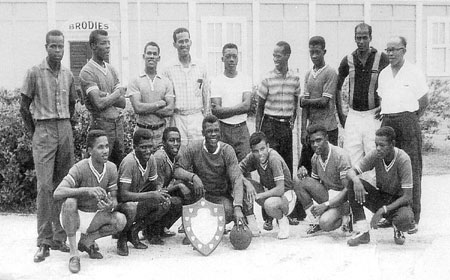BELIZE CITY–Legendary Belizean athletes of times past are like “diamonds in the dirt,” and while many of their names might not be inscribed onto Belize’s history books, which we submit that they rightfully deserve, a great many of them were icons who made an indelible mark in the hearts and minds of local sporting enthusiasts, who were fortunate to marvel at their stellar performances during what some refer to as “the golden era” where Belizean sports are concerned.
Today, Amandala was graced by the presence of one such individual in the person of “Gilly” Dunn, a former football player and boxer who was quite popular in his heydays; and for those who might not be familiar with him, he told us a bit about his outstanding football/boxing career in Belize, and how he rose to prominence during the historic 1960s.
Dunn, who is now 72 years old, was conceived on Belizean soil, but, for the past 44 years, he has taken up residence in Port Charlotte, Florida, USA; and thus, he endowed us with a much appreciated courtesy call while on a short 2-week visit for this year’s September celebrations.
The decorated and talented star player and boxer simultaneously played football for several prominent teams for 13 years in Belize City, while boxing at the same time.
A self-proclaimed outside shooter, Dunn, who spoke of his admiration for fellow midfielder, Angus Vernon, practically ruled the left midfield position on football clubs such as the Dunlop team, with which he won three seasons, and the Brodies team, which he later moved on to after the disintegration of the Dunlop team.
He related that the teams with whom he played were engaged in incessant training sessions, so much so that they formed a joint chemistry and created bewildering set plays which made them almost unstoppable.
“Anything I do, I try to be on top,” Dunn declared, as he spoke about the countless hours of personal practice that he endured in order to perfect his balancing act between his two most beloved sports, football and boxing, which, notably, were among the most popular sporting disciplines in colonial Belize in those days.
Dunn proved that he was equally gifted in boxing as much as he was in football when he represented Belize for a boxing tournament in Jamaica in which he was triumphant after a heroic performance in 1963.
His boxing skills, he told us, were partly attributed to good trainers such as Rudolph Bent, who coached him as he became a full-blown professional Belizean boxer and successfully sparred with various Mexican fighters.
Dunn, a middleweight class boxer, recalled that one of his biggest fights was when he went up against Gamio Brennan, who was the British Empire Middleweight Champion, at the Riverside Hall in the late 1960s.
Another memorable fight, he said, was when he faced off against David Obi, affectionately known as “Bredda David” – who later became a punta artist/musician – at the Palace Theatre on world renowned boxer Muhammad Ali’s visit to Belize in 1965.
Having already made a name for himself in Belize (then British Honduras) at the time, Dunn explained that he left the country for the United States in 1970, and after establishing himself, he formulated and managed a semi-pro football team in Los Angeles where he was staying between the years of 1973 and 1974.
The accomplished former athlete, who mentioned that he played his last football game in Normandy, emphasized that he still currently keeps his body active by religiously working out two times a week.
Since Dunn was such a revered sportsman, Amandala prodded him for advice for both Belize’s upcoming footballers, as well as our ill-fated men’s national selection, who are often discouraged after falling prey to lack of adequate training and resources prior to international tournaments.
“In order to beat our competition, Belizean [football] players need to be on the offense and work together as a team, but they also need to train hard and learn each other’s style of play to hold the team together at all times,” Dunn said, as the septuagenarian exhibited specific methods of controlling and dribbling the ball, many of which are uncommon and even nonexistent nowadays.
We were also scheduled to speak with another former famous Belizean boxer from the 1970s known as Raymond “Sixteen” Thompson about his career; however, that meeting did not materialize as planned.

